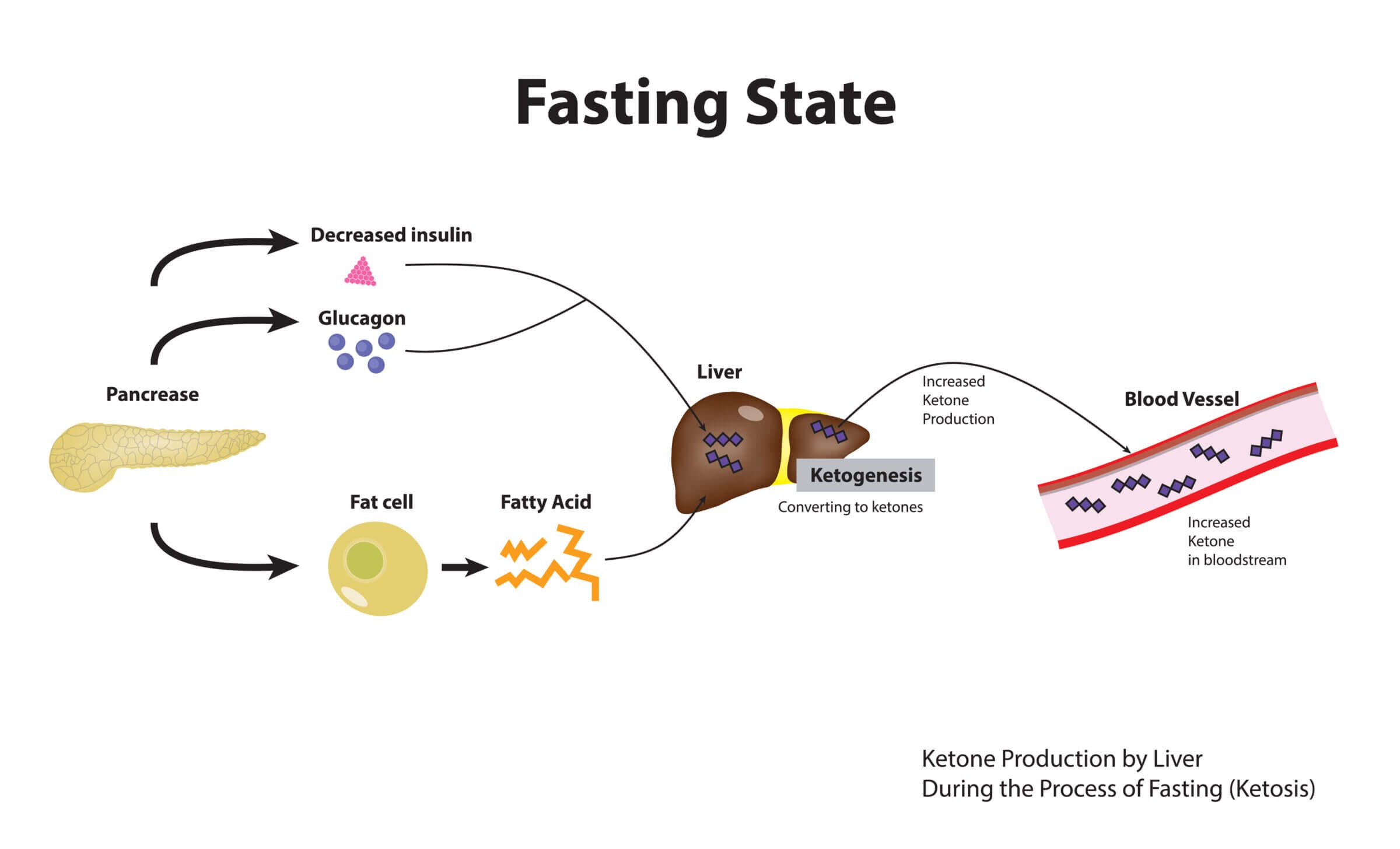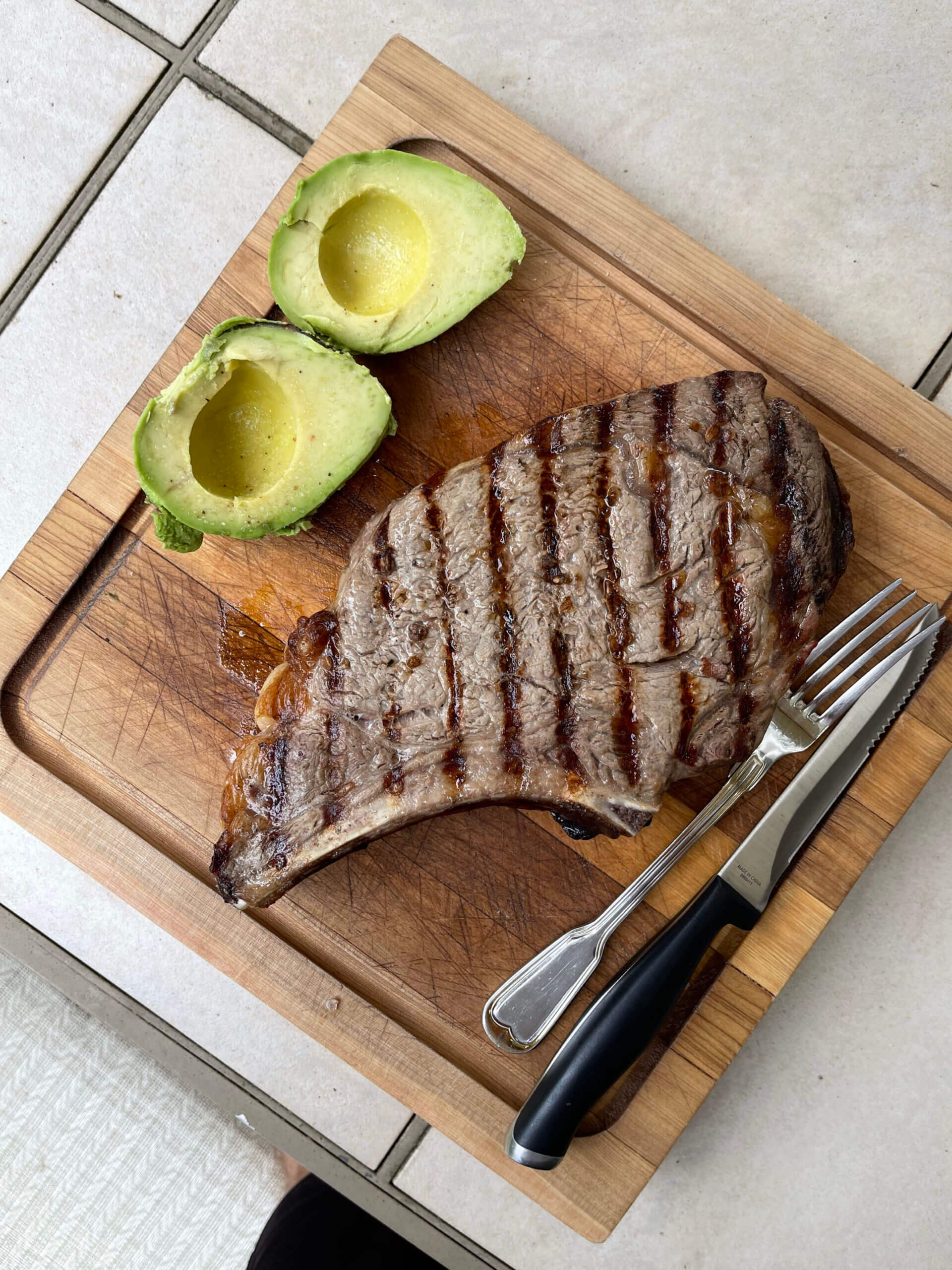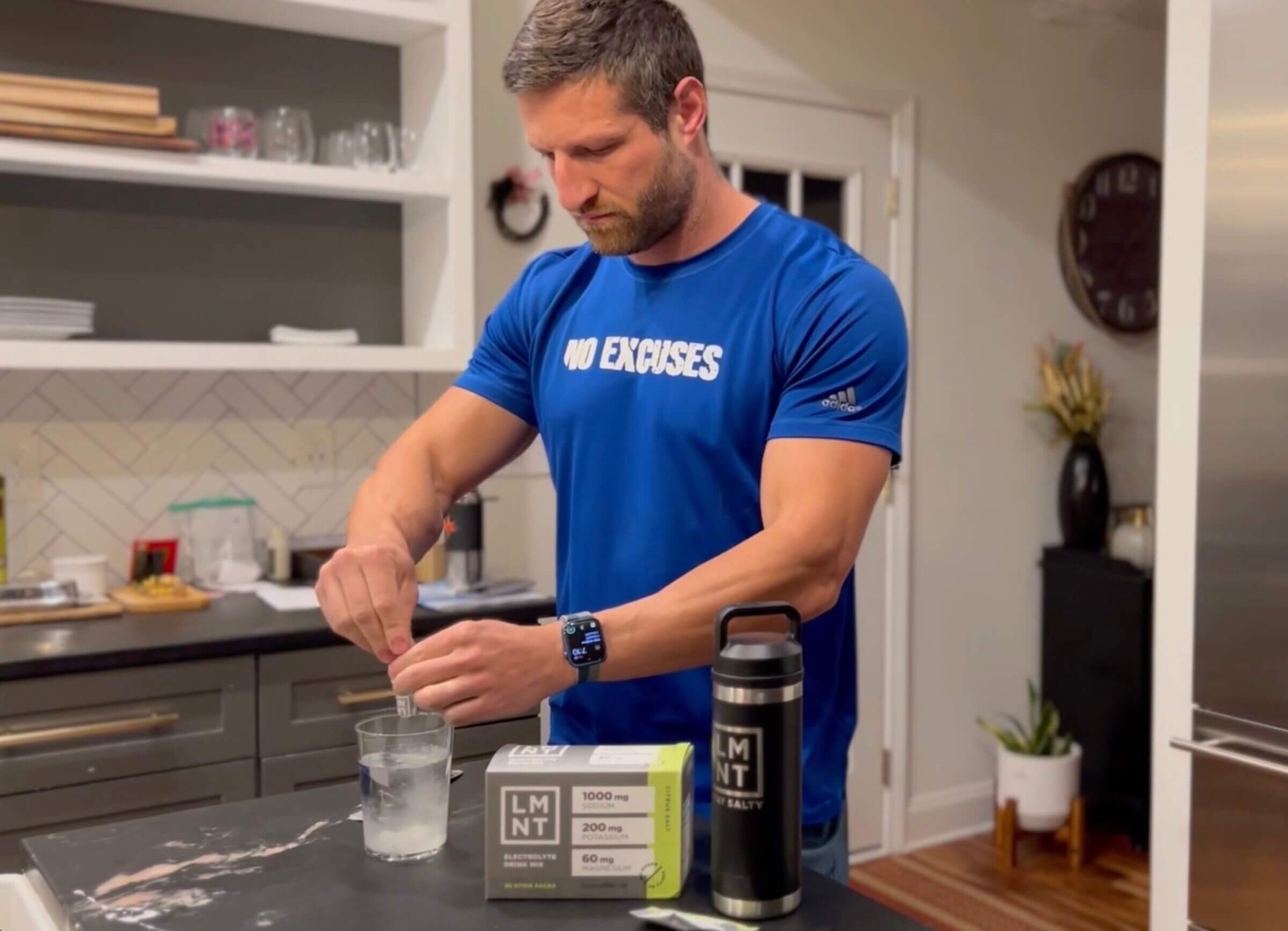When leveraged correctly, intermittent fasting offers numerous health benefits. It’s an excellent tool for improving your metabolic health, losing weight and reducing your risk of developing a chronic disease.
Unfortunately, many people have trouble skipping meals because they get incredibly hungry — and sometimes, incredibly irritated — when they don’t eat for an extended period.
This article will outline six strategies that can make fasting easier and more sustainable over the long-term.
If you’re currently fasting and are struggling to stay on-track, my articles on the reasons you feel hungry and how to curb hunger while fasting provide tips you can implement today.
Top Fasting Tips for Long-Term Success
Both my wife and I have been leveraging the strategies below to make intermittent fasting a regular and natural part of our wellness routine. So let’s jump right in with the most powerful tip that makes going without food a breeze.
1. Improve Your Metabolic Flexibility

The term “metabolic flexibility” describes the body’s ability to easily switch back and forth between different types of fuel. It’s an ability that all humans are born with, but which most of us lose over time thanks to the overconsumption of refined carbohydrates.
As you may already know, glucose (from dietary carbohydrates) is one type of fuel that the body can use for energy. But the body burns through glucose relatively quickly, and its glucose reserves (which are in the form of glycogen stores) are limited to about 2,000 calories.
On the flip side, most organs in your body can also leverage ketones and fatty acids (from dietary sources or body fat) as their fuel source.
Being able to switch back and forth between these fuel types depending on availability is a key factor in how you cope with extended fasting periods.
For example, if you’re fat-adapted — a key indicator of metabolic flexibility — your body can switch to burning ketones or fatty acids for energy in the absence of glucose from dietary carbohydrates. The metabolic state in which the body burns fat for energy is called ketosis, and it’s the underlying principle of the ketogenic diet (one of the top four weight-loss diets).
This is important in the context of fasting because the fat that fuels your body doesn’t have to come from food. When you’re fat-adapted, your body can burn stored fat for energy.
Considering that even the skinniest among us have over 20,000 calories worth of fat stores (compared to just 2,000 calories of glycogen), you can imagine how powerful metabolic flexibility is when it comes to curbing hunger during fasting.
Additionally, understand that the brain is one of the first organs that responds to fuel supply issues. The brain’s preferred fuel is ketones, which are made by burning fat for energy. If you can keep your brain fueled (with ketones) by burning adipose (fat) tissue for energy, you’ll feel significantly less hungry while fasting compared to having no fuel available for your brain at all.
The best way to become metabolically flexible and get into ketosis is to embrace a low-carb ketogenic diet.
I started fasting before embracing a ketogenic diet and found it very difficult. Once I embraced a keto diet, fasting became a regular part of my routine.
These days, my wife and I intermittently fast most days without ever feeling hungry, thanks to our metabolic flexibility.
2. Focus on Sleep Quality

Getting enough sleep and supporting your circadian rhythm are among the best ways to set yourself up for fasting success. If you get sufficient quality sleep and spend enough time in the restorative phases of sleep (slow-wave and REM sleep), you wake up physically and mentally recovered, which leads to improved energy levels and a reduced risk of getting the “munchies.”
The reasons why sleep deprivation causes food cravings are rooted in two hormones: leptin and ghrelin.
Leptin is responsible for suppressing hunger, and sleep deprivation leads to low leptin levels. On the other side of the spectrum is ghrelin, a hormone that makes you hungry. When you’re sleep-deprived, ghrelin levels rise.
Additionally, sleep deprivation lowers your mental strength to withstand the feeling of hunger, making it harder to refrain from breaking your fast.
I recommend sticking to a regular bedtime, avoiding caffeine and alcohol before bed, and avoiding artificial blue light after sunset. By doing so, you’ll set yourself up for a better night’s sleep, which in turn makes fasting much easier. (If you can’t avoid blue light, wear blue light blocking glasses.)
I’ve noticed that I feel hungry quicker and more often when I’ve had a bad night’s sleep. On those days, I make sure I get enough sunlight as soon as the sun rises, because exposure to sunlight helps regulate energy levels. If I sit at home under artificial light, I’m much more likely to eat.
However, it’s also worth noting that fasting is a hormetic stressor that can push you over the edge if you’re already at your limit. So on days when I’m close to my stress limit due to factors such as illness, strenuous physical activity or unusually poor sleep, I don’t fast and I recommend avoiding it as well, because too much stress (regardless of the type) can be counterproductive.
Check out my ultimate sleep guide for more tips on how to sleep better and fall asleep faster.
3. Limit Your Consumption of Alcohol and Cannabis

Recreational drugs such as alcohol and cannabis can be detrimental to your fasting efforts because they can stimulate your appetite — the opposite of what you need when you’re trying to abstain from eating.
For example, consuming alcohol reduces your leptin levels. Leptin is a hormone that’s involved in suppressing hunger, so when you have lower leptin levels you feel hungrier.
Additionally, many recreational drugs (i.e., cannabis) can be addictive because they stimulate the pleasure center of your brain. My personal experience has been that the fewer cravings I have while fasting, the easier it is to feel good without eating.
Additionally, studies have shown that alcohol alters the bacterial composition in your gut. That’s important to know because there is mounting scientific evidence that the microbes in your gut influence your food cravings.
In other words, if your gut microbiome is disturbed or unbalanced, you might experience cravings that make it harder to fast.
That’s why I recommend staying away from alcohol and other recreational drugs not only during your fast, but also on the days leading up to your fast.
4. Manage Your Stress

Studies have shown that stress causes a rise in ghrelin levels. Ghrelin is the “hunger hormone,” which I discuss in detail in my article about how to curb hunger while fasting.
In fact, chronic stress can lead to chronically elevated ghrelin levels, making it incredibly hard to fast.
That’s why it’s important to find ways to better manage stress.
The most effective way to reduce stress that I’ve found is to remove the stressor. For example, if finding the time to go to the gym seven days a week is stressing you out, then work out less often.
I’d argue that by reducing your chronic stress, you’ll maintain better overall health — even if you end up exercising less.
Additionally, you’ll likely find it easier to fast when your stress levels are low (due to lower ghrelin levels).
If removing a stressor from your life isn’t feasible, the next best thing is to manage your stress and change how you perceive it.
Some of the best stress management techniques I’ve used include:
- Breathing
- Mindfulness
- Sauna bathing
- Exercise
- Cold plunging
- Stress relief gadgets
I can tell you from experience that removing stressors from my life and better managing the ones that remain has made it much easier to maintain a regular fasting schedule without feeling hungry.
5. Watch What You Eat During Your Eating Window

Some fasting enthusiasts are under the misconception that because they practice intermittent fasting they can eat whatever they want during their eating window.
Needless to say, consuming highly processed junk food — such as refined carbs and industrial seed oils — undoes most of (if not all of) the benefits you gain from fasting.
Additionally, what you eat during your eating window has a dramatic impact on how well you do during your fasting window, as I explain in my article about the top reasons you feel hungry.
For example, consuming predominantly refined carbs, sugar and seed oils during your eating window not only prevents your body from switching to fat burning while fasting but also results in blood sugar spikes and subsequent drops that will likely cause hunger pangs as your body scrambles to fuel your brain with glucose.
As a result, I highly recommend sticking to a diet that’s high in protein and fat during your eating window and limiting your carb intake. That slows down digestion, helps you maintain stable blood sugar levels, and keeps you feeling satiated for longer.
6. Stay Well Hydrated

Proper hydration plays an important role in how good you feel in the absence of food, because mild dehydration can sometimes manifest as hunger.
In addition to drinking plenty of water, I also recommend increasing your electrolyte intake. In the absence of food, your body is likely going to tap into stored glycogen (to make glucose available to the cells that require it). Glycogen is three to four parts water (depending on where it’s stored). So any time the body releases glycogen, it flushes out water that your kidneys excrete via urine. With that excretion, you lose electrolytes, including sodium, magnesium and potassium.
As a result, intermittent fasting can quickly lead to an electrolyte imbalance if you fail to replenish them. That’s why I make sure to add liberal amounts of salt (sodium) to my meals. And on days when I work out or use the sauna, I use electrolyte supplements (my favorite being LMNT).
In case you’re worried about whether a high sodium intake may affect your cardiovascular health (e.g., high blood pressure), rest assured that the sodium recommendations by the American Heart Association are outdated. Recent studies have shown consuming less than 2,000 mg of sodium per day poses the greatest risk of developing a cardiovascular disease.
The sweet spot is actually between 5,000 to 8,000 mg, depending on how active you are, how much you sweat, and other variables. That’s about four times as much as the U.S. government says your sodium intake should be.
To learn more about the low-sodium myth and similar misconceptions, check out my article about the top nutrition myths debunked.
A Note About Medical Conditions and Medications
Before starting any fasting routine, I highly recommend consulting a knowledgeable medical professional. That’s particularly important if you’re breastfeeding, have a medical condition (e.g., Type 2 diabetes or eating disorders), or if you take certain medications, such as insulin or psychopharmaca that could cause side effects, impact your appetite, or impact how your body responds to food (or a lack thereof).
Frequently Asked Questions
Depending on your fasting goals, there are only a few foods you can consume while fasting, including soluble fiber (e.g., acacia fiber) or pure fat (e.g., MCT oil, butter or coconut oil). Of course, if you’re fasting to repair your gut, I’d stay away from all foods and stick to water, black coffee or tea only.
Some people like to drink bone broth while fasting. Bone broth has protein and technically breaks your fast. However, living off bone broth for extended periods (and nothing else) may still offer some health benefits, including weight loss and making it easier to get into ketosis.
Generally, you can consume non-caloric drinks, such as water, tea or black coffee. Depending on your fasting goals, you can also add pure fat in the form of MCT oil and butter to your coffee, which helps with ketone production and keeps you satiated.
Note that some fasting purists don’t drink anything but water (known as a water fast). There is nothing wrong with that, but if drinking black coffee (with or without fat) helps you extend your fast by a few hours, I’d rather have you do that instead of breaking your fast early.
My recommendation is to start fasting after your last meal of the day. Leveraging the time you sleep for fasting makes it relatively easy to extend your fast.
My wife and I used to intermittently fast every day for 16 hours, but I no longer recommend a strict fasting routine. These days, I like to frequently change my eating patterns based on how I feel, my stress levels and other factors.
That’s because I strongly believe that inconsistent fasting periods better reflect how our ancestors would have eaten (and fasted). I pay especially close attention to how I feel. If I’m not hungry, I don’t eat. While that may sound like a no-brainer, most people I know let their schedule determine their meal schedule rather than basing their meal schedule on their body’s need for food.
Coincidentally, I still end up fasting almost every day simply because I don’t get hungry until about the 16-hour mark. But if you feel that a consistent fasting routine helps you with getting started, there is nothing wrong with planning out your fasting days ahead of time.
If done right, intermittent fasting can be a powerful weight loss tool. However, it’s important to avoid maintaining a caloric deficit over long periods because it’ll likely lead to the well-known yo-yo effect.
As a result, I recommend alternate day fasting to avoid consuming fewer calories than your body needs every day. To learn more about why chronic caloric restriction doesn’t work, check out my article about the reasons why you’re not losing weight.
How to Make Intermittent Fasting Easier: Summary & Final Thoughts
Arguably the best strategy to make intermittent fasting easy in the long run is to become metabolically flexible by allowing your body to tap into its own fat stores as a source of energy. Combined with good sleep hygiene, proper stress management and the avoidance of certain recreational drugs, abstaining from food for periods of time can be a pleasant experience that you can make a regular part of your wellness routine.
Just be smart about it by avoiding junk food during your eating window, avoid breaking fasts with fast-burning carbs (to avoid blood sugar spikes), and take a break from fasting if your overall stress levels are too high on a given day.

Michael Kummer is a healthy living enthusiast and CrossFit athlete whose goal is to help people achieve optimal health by bridging the gap between ancestral living and the demands of modern society.
Medical Disclaimer
The information shared on this blog is for educational purposes only, is not a substitute for the advice of medical doctors or registered dieticians (which we are not) and should not be used to prevent, diagnose, or treat any condition. Consult with a physician before starting a fitness regimen, adding supplements to your diet, or making other changes that may affect your medications, treatment plan or overall health. MichaelKummer.com and its owner MK Media Group, LLC are not liable for how you use and implement the information shared here, which is based on the opinions of the authors formed after engaging in personal use and research. We recommend products, services, or programs and are sometimes compensated for doing so as affiliates. Please read our Terms and Conditions for further information, including our privacy policy.

